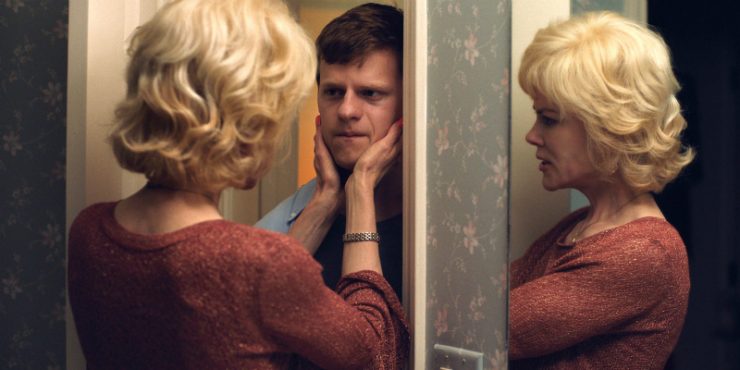The protagonist of Boy Erased leads an incredibly normal life. His father runs a Ford dealership in their Arkansas town, while his mother is a hairdresser. He succeeds in high school, plays on the basketball team, has a girlfriend. With college on the way, Jared Eamons (played here by Lucas Hedges) seems to be floating along the path to normal adulthood, America sees it. But Jared is also gay, and his father is also a Baptist preacher. When these two facts are brought together, their traditional family dynamic falls apart quickly, and Jared is placed into a program. These days, we would refer to it as “conversion therapy”. Church-based and frighteningly draconian, the program threatens to break Jared’s spirit and deny him his identity.
Boy Erased is based on Garrard Conley’s memoir of the same name. His book has been adapted and directed by Joel Edgerton, the Australian actor’s second feature. Edgerton brings with him a couple more Australian heavy-hitters in Russell Crowe, who plays Jared’s father Marshall, and Nicole Kidman, who plays his mother Nancy. Edgerton also casts himself as Victor Sykes, a “therapist” at Love in Action which credits itself as an “ex-gay Christian ministry”. Edgerton’s Sykes will remind some of Nurse Ratched from One Flew Over The Cuckoo’s Nest, a principled authority figure not averse to using manipulation to get the results he needs. It’s also obvious that his “clients” are secondary to his process.
Sykes employs numerous methods to get all of the people in the program – most of them teenagers and young adults – to conceptualize their self-hatred and resentment. He continually strikes down their behavior as “a choice”, but more damningly as “a sin”. When that doesn’t work, he uses intimidation in the form of Brandon (Flea), a tatted up ex-con with no ties to the queer community but an apparent authority in masculinity. Brandon is willing to scare those that Sykes is trying to warm. It’s a horrifying bad cop/worse cop routine which leaves Jared and the others helpless in the face of understanding their own sexuality. It doesn’t take long for Jared to realize that this is not what he signed up for, but leaving will be harder than he thinks.
I have not read Conley’s memoir, but Edgerton’s adaptation is a scathing critique of American evangelicalism. As a Baptist preacher, Marshall feels he is unable to be both a servant of God and the father of a gay son. On the other end, Victor often warps the logic of Christianity to argue the immorality, and moreover the abnormality, of homosexuality. Both employ different kinds of psychological abuse, and both play a hand in crafting truly damaged individuals. In that regard, Boy Erased feels just as much like a film about the perversion of Christian ethos than about conversion therapy. For Edgerton, the two are commingled in shame, a two-headed atrocity that attacks the vulnerable minds of young men and women. The details of what happens at Love in Action are unsettling and heartbreaking, a truly American tragedy.
The downside is that Edgerton seems to have very little idea what to do with homosexuality as it actually exists outside of victimization, and instead makes Boy Erased a film completely about persecution, which is the meat of the story but hardly the entirety of it. Hedges is touching and effective as Jared, another in a growing list of impressive performances in just the last three years, but Hedges never seems to be playing a real character. The specificity of his plight is washed over for instructional talking points, and for all the film’s posturing about conversion therapy, Edgerton doesn’t seem to be paying a lot credence to the people victimized by it the most.
The performances from Kidman and Crowe, as two parents besieged by having to confront Jared’s sexuality, are about as perfect as they can be. Kidman’s mother is an astonishing portrayal of Christian righteousness giving way to maternal acceptance; while Crowe’s father is a tempest of inner torment, the allowance of faith to destroy what you love most. That these characters get the film’s best moments also betrays what Edgerton is really interested in. I think that Boy Erased can be a very helpful film for certain young people who fear to contemplate the fluidity of their sexuality, but this is also an incredibly personal tale of oppression churned into maudlin melodrama, and I’m not sure that was the desired result.
Written for the Screen and Directed by Joel Edgerton










